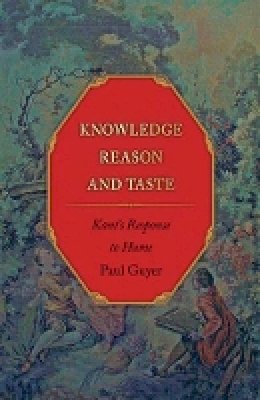
Stock image for illustration purposes only - book cover, edition or condition may vary.
Knowledge, Reason, and Taste: Kant´s Response to Hume
Paul Guyer
€ 82.43
FREE Delivery in Ireland
Description for Knowledge, Reason, and Taste: Kant´s Response to Hume
Hardback. Argues that Immanuel Kant's entire philosophy - including his moral philosophy, aesthetics, and teleology, as well as his metaphysics - can fruitfully be read as an engagement with David Hume. This book describe and assesses Hume's influence throughout Kant's philosophy. It shows where Kant agrees or disagrees with Hume. Num Pages: 288 pages, black & white illustrations. BIC Classification: HPCD. Category: (P) Professional & Vocational; (U) Tertiary Education (US: College). Dimension: 146 x 218 x 27. Weight in Grams: 530.
Immanuel Kant famously said that he was awoken from his "dogmatic slumbers," and led to question the possibility of metaphysics, by David Hume's doubts about causation. Because of this, many philosophers have viewed Hume's influence on Kant as limited to metaphysics. More recently, some philosophers have questioned whether even Kant's metaphysics was really motivated by Hume. In Knowledge, Reason, and Taste, renowned Kant scholar Paul Guyer challenges both of these views. He argues that Kant's entire philosophy--including his moral philosophy, aesthetics, and teleology, as well as his metaphysics--can fruitfully be read as an engagement with Hume. In this book, the first to describe and assess Hume's influence throughout Kant's philosophy, Guyer shows where Kant agrees or disagrees with Hume, and where Kant does or doesn't appear to resolve Hume's doubts. In doing so, Guyer examines the progress both Kant and Hume made on enduring questions about causes, objects, selves, taste, moral principles and motivations, and purpose and design in nature. Finally, Guyer looks at questions Kant and Hume left open to their successors.
Product Details
Format
Hardback
Publication date
2008
Publisher
Princeton University Press United States
Number of pages
282
Condition
New
Number of Pages
288
Place of Publication
New Jersey, United States
ISBN
9780691134390
SKU
V9780691134390
Shipping Time
Usually ships in 15 to 20 working days
Ref
99-15
About Paul Guyer
Paul Guyer is professor of philosophy and the Florence R. C. Murray Professor in the Humanities at the University of Pennsylvania. The author of eight previous books on Kant, he is also general coeditor of "The Cambridge Edition of the Works of Immanuel Kant".
Reviews for Knowledge, Reason, and Taste: Kant´s Response to Hume
"In detail, and with great clarity and fairness, Guyer compares [Kant's and Hume's] respective treatments of scepticism, of the major concepts of causation, objects, and the self, of practical philosophy and of the philosophy of taste. Guyer shows that the match is by no means as one-sided as the usual view maintains."
Simon Blackburn, Times Higher Education "Guyer is noted for his Kant scholarship ... The present book, whose subtitle best expresses its content, is a collection of five previously published essays, somewhat reworked, which range over themes that occupied both Kant and Hume. This is done with magisterial competence."
M.A. Bertman, Choice "Guyer's book provides a masterful reconstruction of the systematic ambition of Kant's critical philosophy and of the third Critique in particular. In addition, he underlines the essential openness and modesty of the Kantian system that is due to Kant's unwavering insistence on the limits of the human powers of cognition
a point that was not heeded by his immediate successors and is often only poorly understood even today."
Peter Gilgen, Monatshefte
Simon Blackburn, Times Higher Education "Guyer is noted for his Kant scholarship ... The present book, whose subtitle best expresses its content, is a collection of five previously published essays, somewhat reworked, which range over themes that occupied both Kant and Hume. This is done with magisterial competence."
M.A. Bertman, Choice "Guyer's book provides a masterful reconstruction of the systematic ambition of Kant's critical philosophy and of the third Critique in particular. In addition, he underlines the essential openness and modesty of the Kantian system that is due to Kant's unwavering insistence on the limits of the human powers of cognition
a point that was not heeded by his immediate successors and is often only poorly understood even today."
Peter Gilgen, Monatshefte
